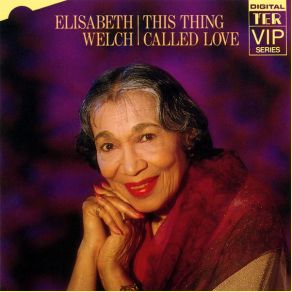This Thing Called Love
Download links and information about This Thing Called Love by Elisabeth Welch. This album was released in 1989 and it belongs to Jazz, Pop genres. It contains 16 tracks with total duration of 47:30 minutes.

|
|
|---|---|
| Artist: | Elisabeth Welch |
| Release date: | 1989 |
| Genre: | Jazz, Pop |
| Tracks: | 16 |
| Duration: | 47:30 |
| Buy it NOW at: | |
| Buy on iTunes $9.99 | |
| Buy on Amazon $28.28 | |
Tracks
[Edit]| No. | Title | Length |
|---|---|---|
| 1. | What Is This Thing Called Love? (from Wake Up and Dream) | 2:58 |
| 2. | Hello, My Lover, Goodbye | 3:44 |
| 3. | Porgy (from Blackbirds of 1928) | 3:19 |
| 4. | When Your Lover Has Gone | 3:33 |
| 5. | Yesterday | 2:25 |
| 6. | Boy! What Love Has Done to Me (Girl Crazy) | 3:08 |
| 7. | If I Ever Fall In Love Again (from the Crooked Mile) | 2:38 |
| 8. | Long Before I Knew You (from Bells Are Ringing) | 3:27 |
| 9. | I Love You Truly | 2:24 |
| 10. | True Love (from High Society) | 2:27 |
| 11. | How Do You Do It? | 3:05 |
| 12. | I'll Follow My Secret Heart (from Conversation Piece) | 2:36 |
| 13. | Losing My Mind (from Follies) | 3:44 |
| 14. | One Life to Live (from Lady In the Dark) | 2:59 |
| 15. | Moon River (from Breakfast At Tiffany's) | 2:57 |
| 16. | Give Me Something to Remember You By | 2:06 |
Details
[Edit]Elisabeth Welch sits astride two important schools of singers. The first is the 1930s cabaret style which, in addition to her, included among its practitioners Hildegarde, Edith Piaf, and Greta Keller. During that same period, Welch was among those Afro-American singers like Eva Taylor, Ethel Waters, and Florence Mills, who transformed the raucous, relatively "countrified," primitive singing style represented by Bessie Smith and Ma Rainey to a more urban and sophisticated style, who were instrumental in opening the way for and influenced the next generation of female jazz singers like Billie Holiday, Ella Fitzgerald, and Peggy Lee.
This Thing Called Love was made in 1989 when Welch was 81. Although her voice is not as powerful as it once was, it hasn't lost those mannerisms associated with great cabaret singing. If anything, it is more dramatic. There's the slight quiver in the voice which enhances the unabashed romantic sentimentality of her delivery and tugs at the heartstrings on "When Your Lover Has Gone" and "Long Before I Knew You." But, with pathos, there's also a bittersweet humor in cabaret, as illustrated by "Boy, What Love Has Done to Me." And what she does with Noël Coward's "I'll Follow My Secret Heart" should be considered the standard interpretation of this song. After 15 cuts, it doesn't seem possible that Welch could have any feeling left to give. But the last cut, "Give Me Something to Remember You By," oozes out the last drop of feeling from a very emotional but sophisticated and entertaining session. The sole playlist entry which seems misplaced is Henry Mancini's "Moon River," which may be the perfect example of the difference between the poignant and the maudlin. Throughout, Welch's respect for and understanding of the lyrics are eminently apparent. Jonathan Cohen's piano dominates the accompaniment. The drums and bass are barely audible. Martin Firth's saxophone gets a play on "One Life to Live." This album is a reminder of what may be becoming a lost art form.